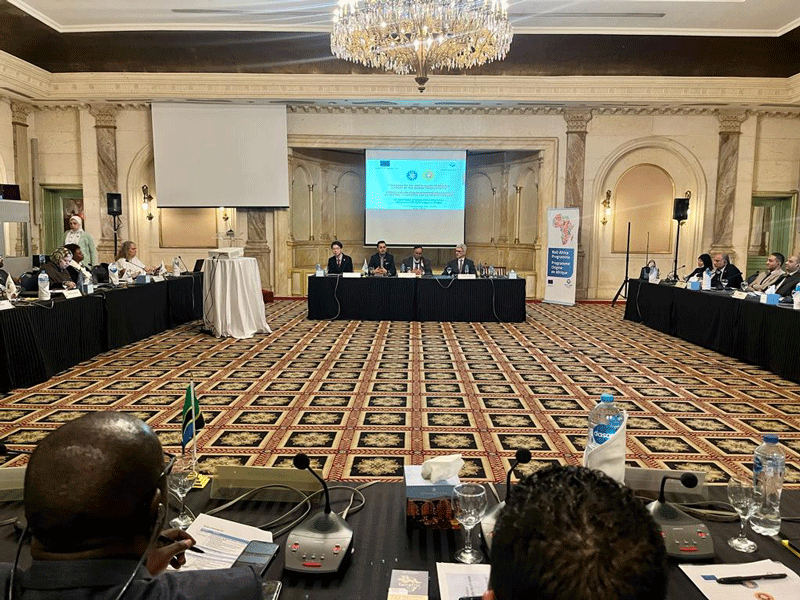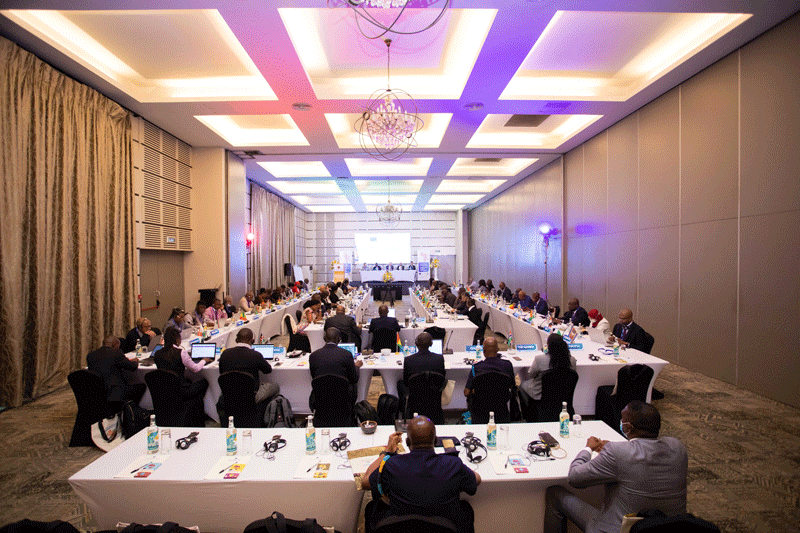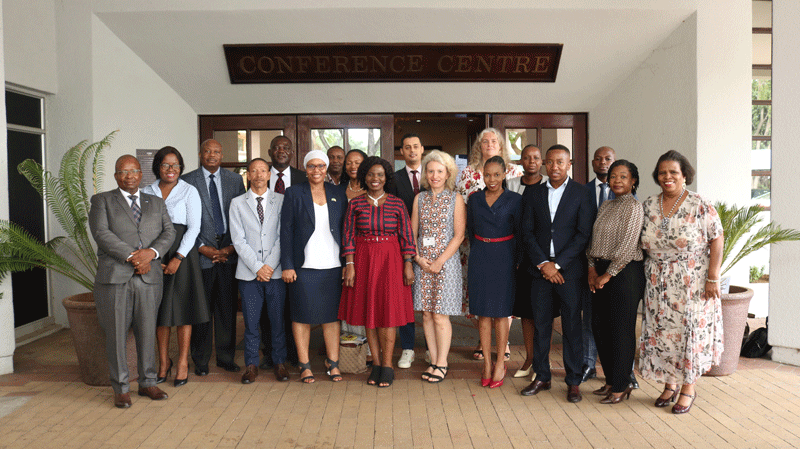Supporting trade integration in Africa : a look at the EU-WCO Rules of Origin Africa Programme
2 March 2023
In December 2021, the WCO Secretariat and the European Commission signed a partnership agreement establishing a programme on the implementation and application of rules of origin in Africa, commonly dubbed the EU-WCO Rules of Origin Africa Programme. This article provides an overview of the activities undertaken as part of this Programme up to January 2023 – that is, just over a year since its inception.
The EU-WCO Rules of Origin (RoO) Africa Programme aims to support Customs administrations on the African continent to improve their capacity to deal with rules of origin and, ultimately, to apply the preferential rules of origin provided for in continental and regional agreements, especially Annex 2 of the African Continental Free Trade Area (AfCFTA) Agreement[1] which defines the nationality of a product within Africa, and hence enables that product to circulate with preferential treatment among the signatories to the Agreement.
The Programme is organized under four components, each dedicated to a group of beneficiaries which are brought together at an annual meeting. These beneficiaries are:
- at continental level, the AfCFTA Secretariat and the African Union Commission (AUC);
- at regional level, the African Regional Economic Communities (RECs),
- at national level, Customs administrations and other relevant government administrations,
- private sector stakeholders.
Supporting the AfCFTA Secretariat
In the inception phase, the focus of the RoO Africa Programme team has been on supporting the AfCFTA Secretariat and the AfCFTA Sub-Committee on Rules of Origin in finalizing Appendix IV to Annex 2 on Rules of Origin, which includes Product Specific Rules (PSR) of Origin for goods traded among State Parties. The team has also assisted with the drafting of the AfCFTA Manual on Rules of Origin, which is a legal instrument complementing Annex 2. Recently, the team has assisted the AfCFTA Secretariat with the technical updating of the AfCFTA Rules of Origin to align them on the latest edition of the Harmonized System (HS), i.e. HS 2022. Once adopted by the AfCFTA legal structures, this update will ensure consistency between HS classification and origin determination.
The WCO Secretariat is also supporting the AfCFTA Initiative on Guided Trade, which brings together eight countries (Cameroon, Egypt, Ghana, Kenya, Mauritius, Rwanda, Tanzania and Tunisia) whose tariff offers on goods have been fully approved and officially published, to test procedures and processes related to the determination of preferential origin under the provisions of the Agreement; the aim of this initiative is to provide practical orientation and supervision for the clearance of selected shipments.

The launch of the initiative was preceded by the publication of the AfCFTA e-tariff book and the AfCFTA Rules of Origin Manual. At the end of 2022, the RoO Africa Programme team organized a workshop for Customs officials and private sector representatives from the countries involved in the initiative, in partnership with the Egyptian Customs Authority, with the aim of ensuring that Customs administrations and traders have an in-depth understanding of the rules and are able to, respectively, implement and claim preferential origin.
Consultations and needs assessment
Delivery of technical assistance and capacity building activities started in July 2022, after the RoO Africa Programme was officially launched at a conference attended by representatives of various national, regional and international bodies as well as experts on rules of origin. Together they discussed and identified the best avenues for the efficient delivery of meaningful support and capacity building to all stakeholders under this initiative.

In order to take stock of the management of rules of origin and the challenges this poses at the regional level, the Programme team also conducted two regional consultations, one in partnership with the Economic Community of West African States (ECOWAS) and one in partnership with the Southern African Development Community (SADC). The objective of these consultations was to gather views on how Customs and the private sector can navigate between the multiple preferential trade schemes on the continent (the “spaghetti bowl”), and how to make proper use of these schemes to boost regional integration. Further consultations are planned, with other RECs, to identify technical assistance needs for implementing the AfCFTA Agreement, EPAs and other FTAs, as well as to explore other opportunities for streamlining processes in Africa.
Capacity building activities conducted from July to December 2022
Programme activities are aimed especially at ensuring that Customs administrations fully understand the AfCFTA RoO – a prerequisite and a game changer for successful trading under the AfCFTA Agreement – and are able to implement them effectively and in a coordinated and harmonized manner. As the AfCFTA builds upon the achievements made within the RECs rather than replacing them, the Programme team also supports a number of RECs in implementing procedures related to rules of origin.
Malawi
A diagnostic was conducted for the Malawi Revenue Authority (MRA), to analyse origin management within the Administration and make recommendations for reform and modernization. The analysis work involved MRA officials working in the areas of origin, risk management, post clearance audit, legal affairs, human resources and training.
Cote d’Ivoire
A workshop on the development of an advance rulings mechanism was organized online for Cote d’Ivoire Customs, in cooperation with the German Agency for International Cooperation (GIZ). The WCO Secretariat’s contribution consisted mainly of reviewing areas of the legal, procedural and organizational frameworks and providing technical assistance with the drafting of legal and procedural texts, as well as ensuring quality control of such documents.
The Gambia
A training workshop was organized for the Gambia Revenue Authority (GRA). Participants acquired an in-depth, structured knowledge of the application of rules of origin, making it possible to expand that knowledge within the Customs Administration.
Botswana
A national workshop on the development of an advance rulings mechanism was organized in partnership with the Botswana Unified Revenue Service (BURS), with the participation of Customs officials from Classification, Valuation and Origin. The objective of the workshop was to assist BURS with reviewing the draft Advance Rulings Guidelines document, and to enhance officials’ knowledge and application of advance rulings.

RECS
Self-certification is included in the ECOWAS Additional Act signed in 2018, but has not yet been implemented by ECOWAS members. To support the implementation and use of self-certification schemes when requesting preferential origin under the REC or AfCFTA provisions, a pilot project has been initiated and the RoO Africa Programme team has organized a workshop on self-certification for the ECOWAS Secretariat and certain ECOWAS member countries (Cote d’Ivoire, Ghana, Niger, Nigeria and Senegal).
The Programme team has also assisted SADC with the technical updating of the SADC rules of origin to align them on HS 2022. The application of an updated version of the rules of origin in the SADC Protocol on Trade will facilitate the use of preferential origin provisions by traders, as well as correct duty collection.
Private Sector
Trade agreements and arrangements are made for businesses. It follows logically, therefore, that any programme aimed at supporting the implementation of an FTA should also provide guidance to businesses so that they can use and implement it. With this in mind, the Programme team has published a Quick Guide on AfCFTA Rules of Origin. The Guide does not in any way replace the AfCFTA legal documents on rules of origin, but explains essential technical terms and concepts as well as the steps to be taken in order to benefit from preferential treatment.
Moreover, and as reported in this article, some of the workshops organized by the Programme team were open to private sector representatives. In addition, the team stands ready to assist industries and traders in a more direct way; for example, it organized an online workshop on the use of AfCFTA cumulation provisions for a company which had initiated a project to examine whether the AfCFTA could enable African farmers cultivating tobacco leaf to sell their products to African-based manufacturing sites under preferential treatment, as this would enable them to offer competitive prices.
Capacity building activities for the private sector should, as a general principle, be conducted in cooperation with Customs administrations. Businesses and trade organizations operating in Africa and wishing to benefit from technical assistance in the area of rules of origin should reach out either to the Customs administration of the country in which they are based or directly to the RoO Africa Programme.
More information
EU-WCORoOAfrica.Program@wcoomd.org
[1] The AfCFTA Agreement entered into force on 30 May 2019, and the Operational Instruments governing trade under the AfCFTA regime were launched in Niamey, Niger in July 2019. Trading under the AfCFTA Agreement commenced on 1 January 2021.

